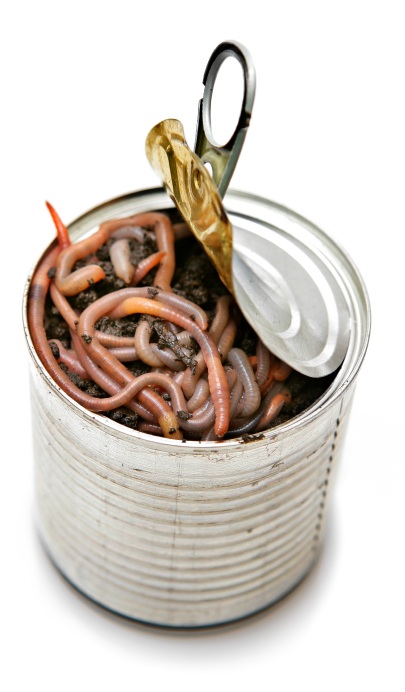 |
| Can of annelids |
But maybe that's not what you're thinking at all. Because if you follow this blog you may be familiar with how poorly we understand the causal relationships between genes and so many of our emotionally- and socially- and politically-charged behaviors, disease risks, and causes of death. That is, at least for the genes we know about. And what's a 'gene' these days anyway? It's not necessarily restricted to a stretch of nucleotides.
But it's only nucleotides, or more specifically SNPs (single nucleotide polymorphisms; pronounced "snips"), that 23andMe analyzes. They genotype thousands of SNPs that vary in people including those that link us to our relatives around the world, to interesting phenotypic traits (like whether our pee stinks when we eat asparagus), and to diseases and risks of developing diseases (like diabetes and Alzheimer's).
Ah, there it is...CAN OF WORMS!
But can a DNA test tell you that you're going to die? No, you know that already. Struggling with death is a part of life and certainly not a topic new to college classrooms.
But if wild classroom worms make you squirm beyond your comfort zone, then this definitely is not the right curriculum for you to implement. On the other hand, if you're like me and you believe that opening cans of worms is an often awkward but crucial part of your job then... okay...you're with me. Still, maybe you're wondering about the disease risk information? That's still pretty harsh, right?
It can be. Which is why I told the students that agreeing to 23andMe's terms of service is basically acknowledging that you are willing to be traumatized and that you can't blame anyone but yourself for choosing to go through with it.
Some didn't. It's completely voluntary. Students who do not want to send in their saliva for analysis can make a demo account and still participate fully and still earn an A in the course. They can also opt out of seeing disease risk results (and only see ancestry data) when the results come back to them.
Totally on board with being traumatized, many took the codes home with them to order their spit kits on-line. They did this despite the small chance that peering into their genome may show them evidence to suggest that their father did not father them.
Wait. What?
Yes. That really is possible... THE KING OF THE WORMS!
 |
| http://scienceblogs.com/zooillogix/2008/05/giant_blue_earthworms_and_frie.php |
But like I said, regardless of the high risk that they'll learn of risks, most students will still spit in the tube and send it off. And I believe this will be true not just of my students but this generation at-large in just a few short years (or less).
The cost is already ridiculously low compared to just a few years ago. With about 200 of your dollars and up to eight weeks of your patience, 23andMe can do what just recently took thousands or even millions of dollars not to mention years to accomplish. And the price just keeps dropping. Once it's low enough, everyone will be having large portions of their genome analyzed, with just a click of the mouse and a spit in a tube and a stamp in the mail. That's it. And most of those people who have or who will participate in such a thing would not have the support of an entire college course, their peers, the faculty and the stellar guest experts (ethics, counseling, law, adaptation, geographic variation, disease risk variation, and the Personal Genome Project) that are coming to visit us in April.
The personal genome can of worms is already open. This curriculum may be cutting edge but it really is just about going along for the ride, but with eyes wider open than the dude in his mom's basement on his brother's old laptop with his dad's credit card.
We're pioneers of introspection and explorers of identity, much like the first folks to be photographed. We all take for granted seeing snaps of our person; soon we'll take for granted seeing SNPs of our personal genome.
 |
First humans to be snapped: Boulevard du Temple by Daguerre, 1839 (wikipedia) |
Some of the students involved in this curriculum started a terrific blog. Check it out!

5 comments:
Ditto on the well put, Ken. Thanks for your most helpful comment.
Great project, Holly! There's a paper in today's Science, which makes all of this even more complicated, perhaps. "A Systematic Survey of Loss-of-Function Variants in Human Protein-Coding Genes", MacArthur et al., looks at sequences from the 1000 Genome Project and finds that "human genomes typically contain ~100 genuine LoF variants with ~20 genes completely inactivated. We identify rare and likely deleterious LoF [loss of function] alleles, including 26 known and 21 predicted severe disease–causing variants, as well as common LoF variants in nonessential genes." Most people are heterozygous for such variants, but not for all of them.
So, deleted or mutant genes need not have any effect at all. It may be that mutant genes, by still working, have effect more often than simply dead genes, but the fact that the latter can be routinely survivable raises (yet another) flag about how our genome sequences should be interpreted.
I took this class, I think, over 20 years ago as an Anthropology minor at Penn State. We didn't do anything nearly as cool as this, but I really enjoyed the class and learned a great deal that I've retained to this day. I am very happy to see you bringing such exciting and fun projects into the curriculum. Good for you and keep it up. I wish I could come back.
Thanks Jeffrey!
Post a Comment